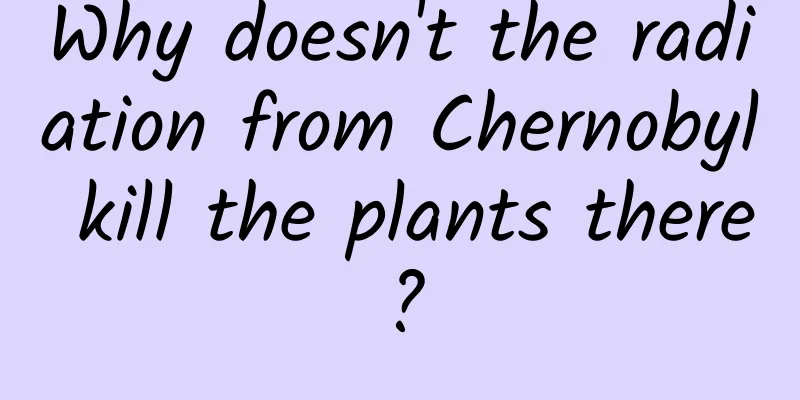Why doesn't the radiation from Chernobyl kill the plants there?

|
Chernobyl - site of the worst nuclear power disaster in history, which occurred in 1986. A nuclear power plant accident here turned the once densely populated area into a 2,600 square kilometer exclusion zone. But this is not a forbidden zone for life. In recent years, many animals such as wolves, wild boars and bears have gradually appeared in the forest in this forbidden zone. Although nuclear radiation may still exist here, it does not seem to have much impact on these animals. Before these animals, plants had already lived here for many years and were living quite well. In fact, three years after the Chernobyl nuclear power plant disaster, vegetation here had already begun to recover. So why can plants recover in such a short time? To answer this question, we first need to understand how nuclear radiation affects living cells. The radioactive materials produced by nuclear reactors can continuously emit high-mass particles in all directions, attacking the cell structures of living cells. If a cell is damaged, most of the material inside it can be replaced, but DNA is an exception. This thing is very fragile. If the radiation is strong enough, the DNA will be damaged - for example, the DNA sequence will be reversed or broken, leading to rapid cell death. Therefore, the surface of the body of a person exposed to nuclear radiation will quickly fester. If the radiation is weak, DNA will not be affected either, because low-intensity radiation can easily cause DNA mutations - such as cancer, thereby changing the function of cells. Such changes generally have negative effects. Humans and other animals mainly rely on DNA to carry out various life activities. If there is a problem with DNA, it will be fatal to humans and other animals. Plants are different, however, because they cannot move, they have no choice but to adapt to their environment. Plants are not like animals, which follow a stable developmental path from birth. They will choose their own developmental path based on their own growth. For example. If the demand for water is greater, the plant will grow its roots deeper into the ground. If they need more sunlight, they will raise their stems and leaves higher. More importantly, unlike animal cells, almost all plant cells are capable of producing new cells needed for any part of the plant. This is why plants can be propagated by cuttings or grafting. This means that plants have stronger regenerative abilities than animals and can recover quickly from damage or radiation. So nuclear radiation has no effect on plants? Of course not. Nuclear radiation can also cause mutations in the plant's DNA. From the outside, the plant looks like it has a tumor. But don't forget that an important difference between plant cells and animal cells is that plant cells have cell walls. It is this cell wall that prevents the mutated cells from spreading from one part of the plant to another, giving the plant a chance to breathe. Let them still survive the radiation! |
Recommend
Case analysis: PepsiCo online and offline linkage planning case
01 Purpose ① Enhance brand image ②Add new users ③...
The "core" of the watermelon is definitely true love! Why is the middle of the watermelon the most delicious? |Expo Daily
Why is the middle of a watermelon the most delici...
Apple opens the floodgates: Developers can now submit iOS 9 software
Not only iOS 9, but also watchOS 2 and OS X El Ca...
How much does it cost to attract investment for Yongzhou Nutrition Products Mini Program?
The advantages of WeChat mini program investment ...
Ten thousand words reveal! The secrets of making money behind live streaming sales by influencers
In 2020, " live streaming with goods " ...
Why can't iPhones be assembled in the United States? They don't even have all the screws
Even though U.S. President Trump personally warne...
Can eating rice like this help you lose weight? Are you tempted?
I heard that cooling down cooked rice, steamed bu...
Ronanxi's good posture goes to heaven, scientific and practical posture practice video
Ronanxi's good posture goes to heaven, scient...
4 core methods for event operation and promotion
There are activities on today’s e-commerce platfo...
Event planning tips!
Low cost and high dissemination, such activities ...
Users (fans) start to leave at an accelerated rate, what else can you do?
If you are extremely sensitive to user activity, ...
How to create highly sticky products? Teach you 3 models
What is CLV? You must understand this word when m...
The risk level of Sujiatun, Liaoning has been adjusted to low risk, and my country's epidemic prevention and control is nearing its end!
Regarding the reduction of the Notice on the risk...
How much does it cost to be an agent of a points app in Ningbo?
How much does it cost to be an agent of a points ...
When products become homogenized, how can operations find opportunities?
In this article, let’s talk about how operators c...









